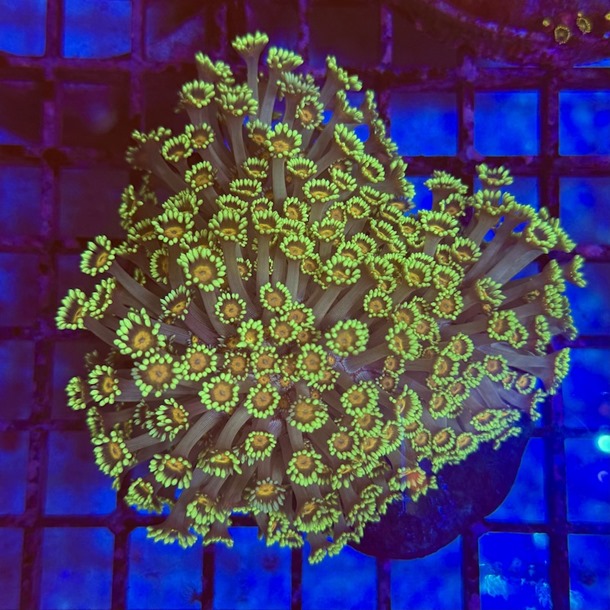Sunflower Goniopora
You will earn 125 Points
The Sunflower Goniopora is an exquisite colour variety of Goniopora coral commonly known as the Daisy Coral, Ball Coral, or Sunflower Coral due to its lovely floral appearance when all of the polyps are opened. The beautiful orange centre and green tentacle colouration of the Sunflower Goniopora further reinforces its floral appearance to dramatic effect. Once established in your reef aquarium, the Sunflower Goniopora is sure to soften empty or harsh rockwork and reefscapes with delicate colour and fantastic visual interest.
Caring for the Sunflower Goniopora is moderately difficult and as such, it is generally not recommended for the novice or beginning reef aquarist. The Sunflower Goniopora should be housed in an established reef aquarium with high water quality. In the wild, Goniopora corals are often found in nutrient-rich shallows near the shore or in lagoons with turbid water conditions. To best replicate these conditions, the Sunflower Goniopora requires moderate lighting conditions achieved by T-5 fluorescent, powerful LED, or more intense metal halide light fixtures combined with medium water movement within the aquarium. For continued good health, the Sunflower Goniopora will benefit from the addition of calcium, strontium, iodine, magnesium and trace elements to the water column.
The Sunflower Goniopora has an aggressive temperament and will extend its sweeper tentacles at night well beyond its base, potentially stinging other species of corals and animals within reach. Therefore, it is important to leave ample space between the Sunflower Goniopora and neighbouring corals. In the home reef aquarium, Clownfish will often host within the polyps of the Sunflower Goniopora if no anemone is present. Keep in mind that this relationship may not be beneficial for the Sunflower Goniopora as over-eager clownfish may stress or inadvertently damage the coral.
The Sunflower Goniopora satisfies much of its nutritional requirements by means of symbiotic photosynthetic zooxanthellae algae hosted within its body. However, it will benefit from regular supplemental feedings in the form of micro-plankton or foods designed for filter-feeding invertebrates.
